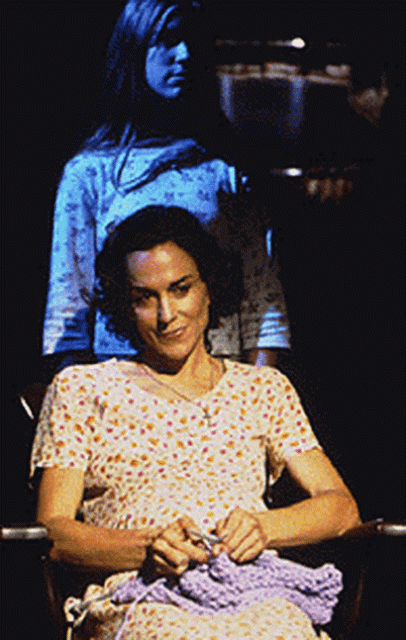
Quite possibly the worst production to grace the usually strong stages of Manhattan Theater Club, Melanie Marnich's Blur couldn't possibly be more like its title. Hazy, plodding and lacking any genuine emotion, this production (helmed by MTC artistic director Lynne Meadow), chronicling the regressive eyesight of a LOA (Leber's Optic Atrophy) patient, shows a lack of eyesight on the part of its makers as well, turning a potentially interesting, loopy play into a "what-are-they-thinking?" spasmodic mess.
We meet the LOA victim, Dot (Angela Goethals), first with her flighty mother (in a one-note, irritating portrayal by Polly Draper) as she first learns of her ailment. It has been passed down through female genes, but always the instigator, Dot's mom chooses to blame it on Dot's father, known mostly as "the stranger." (The relationship between the two is not unlike the one represented in the film "Mermaids," where Cher played a free-spirit mom who couldn't relate to her bright, structured daughter (Winona Ryder)). When her sight deteriorates, Dot begins to hang out with other local misunderstoods, including Francis (Susan Pourfar), a militant, brash lesbian (never seen this before) and Joey D'Amico (Chris Messina), a zookeeper who's slow on the outside but has an abundance of inner emotions and eventually becomes Dot's boyfriend. There is also a priest named Father O'Hara (Bill Raymond), who lets Dot confide in him even as his faith is falling apart as well.
If the plot sounds bizarre, that's because it is. No scene coalesces with the next. It feels like the play was assorted randomly and Meadow and company just figured the audience wouldn't notice. But I will say that Melanie Marnich's script has much potential, as there is a germ of a wonderfully offbeat tragicomedy here, and some lines are sharp. But Meadow, as she did with The Tale of the Allergist's Wife on this same stage, flounders again. When she wants to get a point across, she has her actors shout to the hills (even though Stage II at MTC has only 150 seats) or wallow in false histrionics. Except for character actor Raymond, seen too briefly here, the acting is bloated or underdeveloped. Goethals is a lovely presence, but her performance is too demonstrative and her odd relationship with her mother is never fully believable (with Draper's impossible performance to match, what could have worked?). Pourfar makes little impression, and Messina seems to be undergoing a transformation to become Mark Ruffalo; he looks and sounds very similar, but Ruffalo likely would have done much more with this character and spared us a lot of cutesy, precious delivery. The lack of concentration onstage is equally matched offstage where, at my performance, I could very audibly hear the actors chatting it up when they weren't performing.
